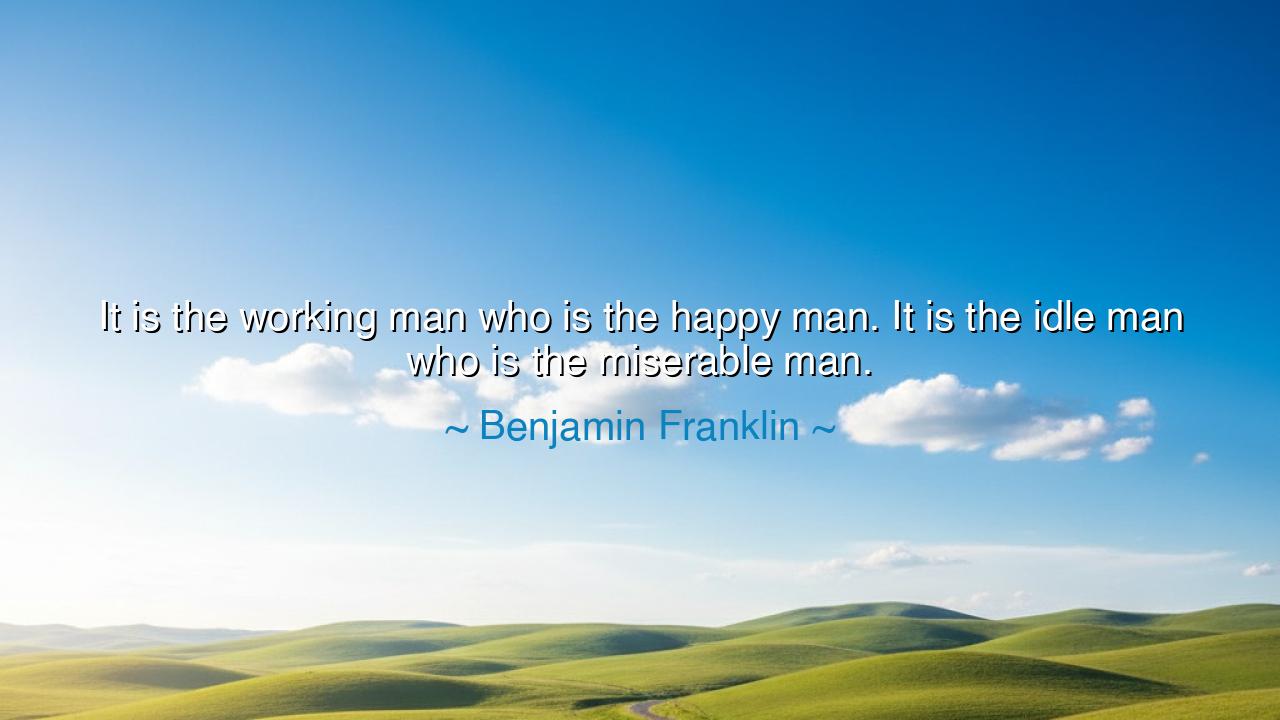
It is the working man who is the happy man. It is the idle man
It is the working man who is the happy man. It is the idle man who is the miserable man.






Benjamin Franklin, sage of industry and father of practical wisdom, once declared: “It is the working man who is the happy man. It is the idle man who is the miserable man.” In these words he revealed the sacred truth that joy is found not in idleness but in work. For labor gives life its rhythm, its purpose, and its dignity, while idleness gnaws at the soul, leaving it restless, empty, and without honor.
The ancients knew this well. The farmer who rose with the dawn to till his field was weary, yet he was happy, for his toil bore fruit, and his family ate in peace. The soldier who trained and marched was sore in body, yet strong in spirit, for his duty gave meaning to his sacrifice. By contrast, the idle man who turned away from work was left hollow, consumed by despair and self-contempt. Franklin speaks here of a universal law: without work, there can be no true happiness.
History offers the shining example of Abraham Lincoln. Born into poverty, he split logs and labored with his hands, teaching himself by candlelight after long days of toil. Far from making him miserable, his work gave him strength of body, discipline of mind, and endurance of spirit. That steady labor prepared him to bear the crushing weight of the presidency during the Civil War. Had he chosen idleness, he would have remained obscure, but through work, he found both greatness and peace of heart.
Franklin himself lived as testimony to his words. A printer, inventor, statesman, and philosopher, he never sought the ease of idleness. Instead, he filled his days with invention, experiment, and service to his nation. In his relentless work, he found satisfaction, honor, and legacy. To him, happiness was not in leisure but in striving — for in striving, man finds his truest self.
Let the generations remember: seek not comfort in idleness, for it breeds misery, weakness, and decay. Embrace work, not as a curse, but as the path to joy and fulfillment. For as Franklin taught, it is the working man who walks in light, strengthened by purpose, while the idle man wanders in shadow, consumed by his own emptiness. Happiness is the child of labor, and misery the offspring of sloth.






QHPham Quang Hieu
I think this quote highlights an interesting truth: people who work, especially with purpose, tend to find fulfillment and happiness. It makes me think about how we often look at rest or leisure as something to aspire to, but perhaps too much of it can lead to feelings of emptiness. Do you agree that a sense of purpose, often found through work, is essential for happiness?
CHChie Ha
This perspective from Franklin seems to suggest that being idle leads to dissatisfaction, but I wonder if there’s a healthy way to rest and recharge without falling into misery. Not all idle time is wasted—it can also be a time for reflection and creativity. What’s your take on the relationship between work and happiness? Can being idle ever be a source of happiness?
TNNguyen Thanh Thao Nhu
I find this quote interesting because it suggests that happiness is tied to action and productivity. It challenges the idea that leisure is the path to happiness, instead making a case for the satisfaction found in hard work. However, do you think it's possible for someone to feel fulfilled and happy without constant work, or is there a real danger in being idle for too long?
KDNguyen Khac Dinh
This quote by Benjamin Franklin really resonates with me because it emphasizes the idea that purpose and fulfillment often come from being actively engaged in work. The working man is happy because he has a sense of accomplishment, while the idle man may feel disconnected or unfulfilled. It makes me wonder: do you think being constantly busy is the key to happiness, or is there a balance between work and rest?